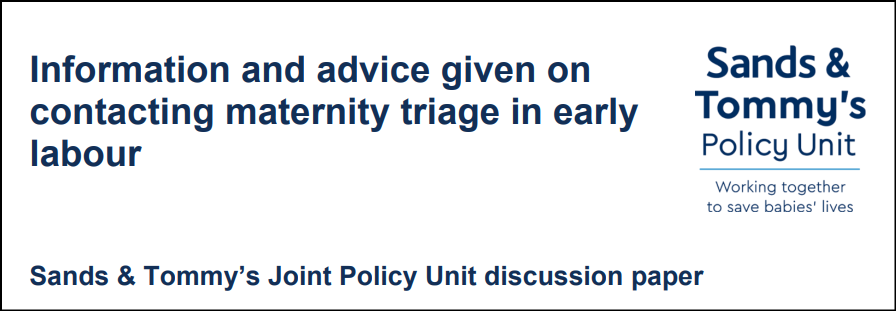NHS urged to improve guidance around medical help in early labour
NHS Trusts in England are providing inconsistent advice about when to seek medical help during early labour, the Sands and Tommy’s Joint Policy Unit has found.
The JPU looked at website information provided by 35 NHS Trusts in England, all aimed at guiding women and birthing people on whether to contact their local maternity triage unit about specific concerns.
Among the issues addressed differently by trusts were bleeding, pain, reduced fetal movement and the timing and length of contractions.
The findings underline the urgent need for improvements in access to and standardisation of information identified in the Pregnancy Loss Review, to support people who experience pregnancy complications before 24 weeks. Tommy’s is working with the Department of Health and Social Care to address some of these specific recommendations.
The JPU found 5 trusts did not mention bleeding at all as a reason to contact maternity triage while 3 made no reference to reduced fetal movement. Fewer than half mentioned pain or pain relief as a trigger for seeking medical advice.
Only 7 websites mentioned changes in vision, 5 mentioned itching and 3 mentioned swelling, although these may signal potentially serious complications such as pre-eclampsia.
However, all websites advised women to call maternity triage if they had any anxieties or concerns or needed more support.
The JPU analysis found that 16 of the trusts encouraged women to stay at home during early labour if they were not experiencing any of the symptoms listed on the website, although this advice is not based on any clear evidence. Some trusts suggested that staying at home is important ‘to help you relax’.
The JPU says: “[T]hese claims...appear to be based on assumptions about what an individual’s home environment is like, and what their preferences are when in labour. To ensure person-centred care, it is important to recognise that for many reasons, people may not find home to be a relaxing environment.”
Robert Wilson, Head of the Sands and Tommy’s Joint Policy Unit, said:
"It’s vital that maternity services provide consistent advice around contacting triage, as well as clear information for women and birthing people about their rights in accessing maternity care.
"We hope our findings will prompt not only discussion but appropriate action. Policymakers must consider whether national guidance is required in this area to ensure consistent, evidence-based advice."
Dr Jyotsna Vohra, Tommy’s Director of Research, Programmes and Impact, said:
"These findings demonstrate yet again that more work is needed to ensure NHS advice and maternity triage systems meet the needs of all women and birthing people.
"As the JPU paper points out, for example, not everyone will find it ‘relaxing’ to be at home during early labour. It also highlights the anxiety and potential risks faced by women and birthing people who are unclear about the advice they are given, as well as the challenges for midwives running triage services.
"Making pregnancy and birth safe for everyone means recognising the differences between people’s circumstances and experiences, and providing the necessary resources to offer the best possible person-centred, evidence-based care in every case."
Recognising this need for urgent improvement, Tommy’s has been working with the Department of Health and Social Care and a number of NHS Trusts to ensure the advice given to women and birthing people at risk of complications is consistent across the NHS and meets approved standards, based on our own PIF (Patient Information Forum) accredited information and guidance.
This includes widening availability of our ‘When to call the midwife’ posters for maternity clinics and healthcare services, as well access to our pregnancy symptom checker resources.
The JPU findings follow reports highlighting concerns around maternity triage at East Kent Hospitals University NHS Foundation Trust and Shrewsbury and Telford NHS Trust.
The Care Quality Commission has also identified maternity triage as an issue during its national maternity inspection programme, raising questions around patient prioritisation, the time taken to make an initial assessment, oversight of those waiting and staff training and competence.
https://www.tommys.org/pregnancy-information/giving-birth/what-do-when-labour-starts
Read more about early labour
-
Read more about 'What to do when labour starts'
What to do when labour starts
You can call your midwife or hospital straight away if you think you’re in labour. You will usually be assessed over the phone. -
Read more about 'Symptoms of labour'
Symptoms of labour
Every labour is different but there are some common signs that your body is getting ready for labour, including contractions and waters breaking -
Read more about '4 ways your body gets ready for labour'
4 ways your body gets ready for labour
At the end of your pregnancy, you may have some signs that your baby will arrive very soon, even though you may not go into labour for a little while yet.

